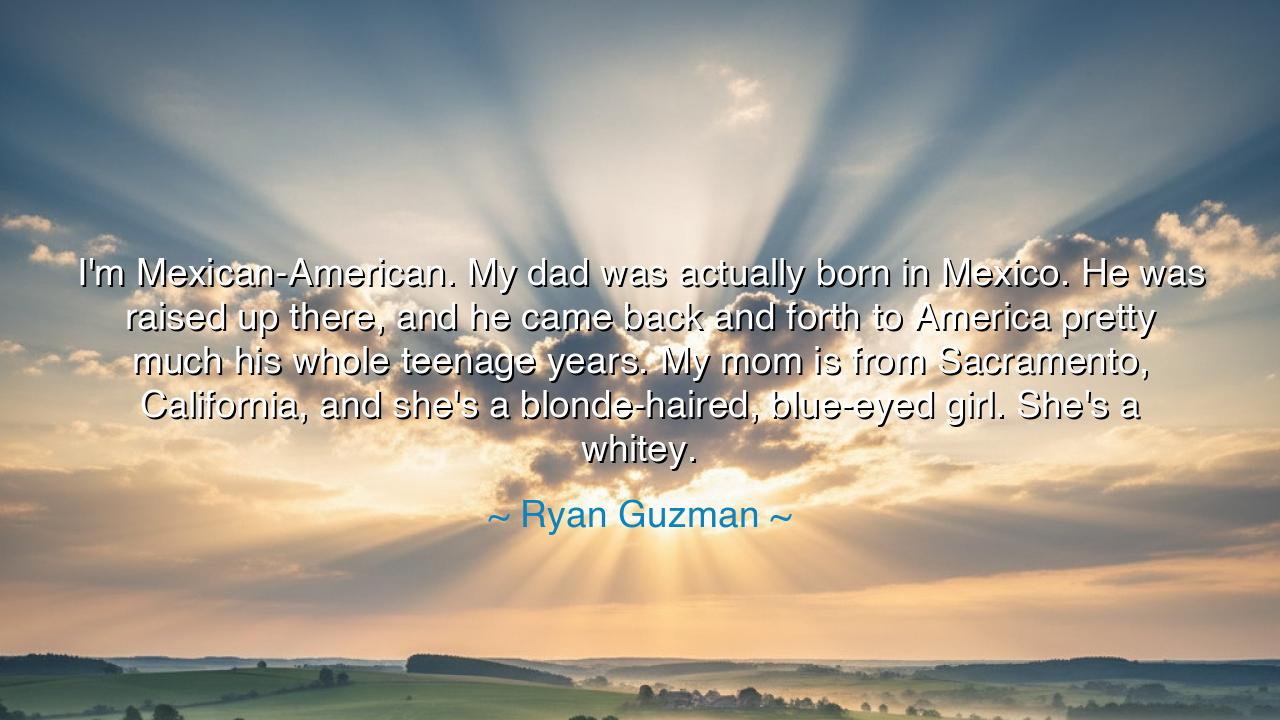
I'm Mexican-American. My dad was actually born in Mexico. He was
I'm Mexican-American. My dad was actually born in Mexico. He was raised up there, and he came back and forth to America pretty much his whole teenage years. My mom is from Sacramento, California, and she's a blonde-haired, blue-eyed girl. She's a whitey.






In the words of Ryan Guzman, the actor of mixed heritage and heartfelt honesty, we hear a reflection on identity that speaks to all ages: “I’m Mexican-American. My dad was actually born in Mexico. He was raised up there, and he came back and forth to America pretty much his whole teenage years. My mom is from Sacramento, California, and she’s a blonde-haired, blue-eyed girl. She’s a whitey.” Beneath the casual rhythm of these words lies a timeless meditation on belonging, heritage, and the duality of identity. His tone is one of affection and candor, yet the meaning runs deep — for in acknowledging both sides of his lineage, Guzman stands as a bridge between worlds, carrying within him the history of migration, adaptation, and the unity of cultures.
To the ancients, the child born of two worlds was often seen as one touched by destiny — a messenger between nations, a weaver of harmony amid difference. Ryan Guzman’s words reveal not confusion but balance, not division but wholeness. He honors the story of his father, who journeyed between Mexico and America, straddling two homelands, carrying the resilience of one and the dreams of the other. He honors his mother, the embodiment of another heritage — the California sun, the Anglo-American spirit. In uniting their stories, he claims both sides as his own, a living testament that identity is not confinement but expansion.
This struggle — and triumph — of blended identity is one known throughout history. Consider the story of Alexander the Great, whose parents came from two worlds: Philip of Macedon, a man of northern discipline, and Olympias of Epirus, fierce and mystical. From this union came a man who carried within him both reason and fire, Greek logic and Eastern vision. His strength lay not in rejecting either lineage, but in embodying both. So too does Ryan Guzman’s reflection remind us that greatness is born not from purity, but from unity — the power to hold multiple truths in one heart.
Guzman’s words also speak to the journey of the Mexican-American — a people shaped by borders yet boundless in spirit. The father who “came back and forth” symbolizes generations who moved between lands in search of opportunity, bearing the dignity of hard work and the ache of separation. The mother, born in Sacramento, represents a land that welcomed yet often misunderstood those who crossed into it. Together, their union tells the story of the American mosaic: of cultures colliding, blending, and birthing something new. In his casual phrasing, the actor gives voice to a truth the ancients knew well — that the identity of a person is not singular, but layered, like the rings of a tree, shaped by all who came before.
There is also humility and humor in his words, for he does not elevate one lineage over the other. He speaks of his mother’s whiteness not with distance but with affection — “She’s a whitey” — as if to say, difference need not divide us. This is wisdom disguised as lightheartedness. The ancients would have praised such balance — for to laugh at difference without denying its presence is the sign of a spirit at peace. Ryan Guzman embraces both roots without shame or apology, understanding that strength comes not from choosing a side, but from accepting the totality of who we are.
Let us remember the lesson hidden within his reflection: that identity is not a prison, but a path — one that leads through memory, culture, and family toward understanding. Many in this world feel the tension of in-betweenness, belonging everywhere and nowhere at once. Yet, as Guzman teaches, the key is not to fear that space, but to claim it. To live as both Mexican and American, both immigrant and native-born, both brown and white, is to embody the future of humanity itself — a world where borders fade before the light of shared purpose and compassion.
The wisdom here is clear: honor your roots, but do not be confined by them. Know where you come from, so that you may walk forward with strength and clarity. Celebrate your heritage, but never let it become a wall between you and others. As Ryan Guzman’s story reminds us, the blood of our ancestors does not divide us — it intertwines us, connecting generations and continents in the living web of humanity. Each of us, in our own way, carries the story of our parents — their struggles, their hopes, their courage — and it is in honoring both that we discover who we truly are.
Thus, the teaching concludes: be proud of your origins, but let your spirit be vast enough to contain them all. Whether your father’s journey began in Mexico or your mother’s in California, whether your skin reflects one heritage or two, you are the living proof that unity can be born from difference. Ryan Guzman’s words remind us that to embrace one’s mixed heritage is to stand as a bridge between past and future — to embody the truth that all people, in the end, share one story, one humanity, and one great home beneath the sky.






AAdministratorAdministrator
Welcome, honored guests. Please leave a comment, we will respond soon